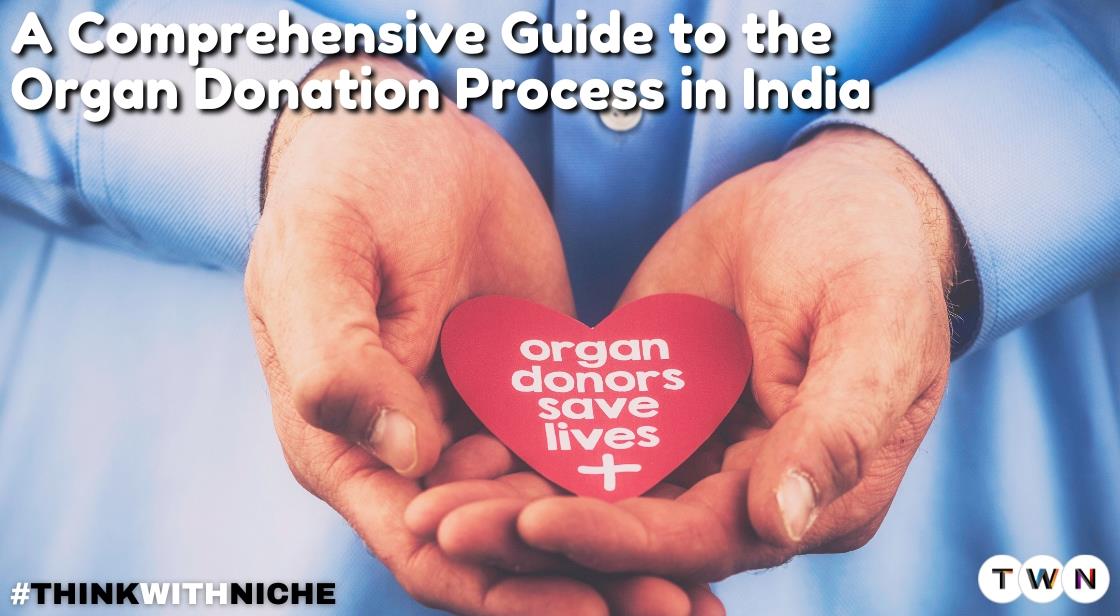A Comprehensive Guide to the Organ Donation Process in India

Blog Post
In India, a staggering number of people – over 5 lakh according to the 2024 data from the Indian Transplantation Society – desperately wait for life-saving organ transplants. Each year, this figure stands in stark contrast to the less than 5,000 organ donations that take place. This immense gap highlights the critical need for increased organ donation awareness and participation.
Organ donation offers a beacon of hope, allowing individuals to give the ultimate gift of life after their passing. With advancements in medical technology and growing public awareness, organ donation rates in India are steadily rising. This comprehensive guide empowers you to navigate the organ donation process, understand eligibility criteria, and learn how to register as a donor.
As of 2024, India's legal framework, the Transplantation of Human Organs and Tissues Act (THOTA) of 1994, ensures a transparent and ethical system for organ donation.
Both living and deceased donors can contribute a range of organs, including kidneys, livers, hearts, lungs, and pancreases. While anyone can register as a potential donor regardless of background, a thorough medical evaluation determines a donor's suitability.
This guide delves deeper into the eligibility criteria for living and deceased donors, incorporating the latest information on streamlined procedures for living donor transplants.
We also explore the types of organs that can be donated and the crucial role of family consent in deceased donation. By understanding the process and openly discussing your wishes with your family, you can make an informed decision about becoming an organ donor and potentially save countless lives.
Exploring the Organ Donation Process in India: Key Steps and Considerations
Organ donation is a life-saving process where organs are retrieved from willing donors, either living or deceased, and transplanted into individuals suffering from organ failure. Over the past few decades, advancements in surgery, organ donation practices, and transplantation medicine have significantly improved the success rates of these procedures.
Recognizing the critical need for organ donation, India established a legal framework, the Transplantation of Human Organs and Tissues Act (THOTA) of 1994. The government has also implemented nationwide campaigns and educational programs to dispel myths surrounding organ donation, raise public awareness about the organ shortage, and clarify the donation process.
As organ donation rates in India continue to rise, this guide provides a comprehensive overview for anyone interested in becoming a donor.
Eligibility for Organ Donation in India: A Comprehensive Look
The Transplantation of Human Organs and Tissues Act (THOTA) of 1994 lays the legal foundation for organ donation in India. Thankfully, the law promotes inclusivity, allowing anyone to register as a potential donor irrespective of age, caste, religion, or community. However, a potential donor's overall health takes precedence over age when determining suitability for donation.
This section delves deeper into the eligibility criteria for both living and deceased donors in India, incorporating the latest information and real-world examples.
Living Donors: Sharing the Gift of Life
Living donors can breathe new life into individuals suffering from organ failure by donating one of the following organs:
-
Kidney: A single healthy kidney is sufficient for a recipient to live a normal life. Technological advancements in laparoscopic surgery have minimized the invasiveness of kidney donation procedures, making it a relatively safe option for eligible donors.
-
Pancreas: A portion of a healthy pancreas can be donated to individuals with severe diabetes or other pancreatic disorders. Strict evaluation is conducted to ensure sufficient pancreatic function remains in the living donor post-surgery.
-
Liver: Partial liver donation is a viable option for patients in need of liver transplants. The liver's remarkable regenerative capacity allows a portion of the organ from a living donor to grow back to near its original size within weeks.
Also Read: Simple Energy Healing Techniques Using Your Hands
Eligibility Criteria for Living Donors:
-
Minimum Age: As per THOTA, the minimum age for a living donor in India is 18 years old.
-
Health Status: Potential donors must undergo a thorough medical evaluation to assess their overall health and fitness for donation. This includes being free from transmissible diseases like HIV, hepatitis, and active infections. Additionally, they should not have any pre-existing health conditions that could be exacerbated by surgery or compromise their long-term health.
-
Emotional Fitness: A psychological evaluation may be conducted to ensure the donor is making an informed and well-considered decision without undue pressure or coercion.
-
Relationship to Recipient: In most cases, living donors are immediate blood relatives (parents, siblings, children) of the recipient to ensure optimal organ compatibility. However, under special circumstances and with strict evaluations by authorization committees, living donor transplants from non-relatives with a strong emotional connection to the recipient can be considered on a case-by-case basis.
Latest update on Living Donor Transplant Approvals
In a significant move towards expediting the living donor organ transplantation process, the Union Government has mandated a precise timeline for health authorities across States and Union Territories. This initiative stems from a directive issued by the Delhi High Court earlier this year, emphasizing the need for swift decision-making in such critical cases.
Setting Clear Timeframes: Faster Decisions for Patients
Following a Delhi High Court order, the Union Government has established a new timeline for processing applications for living donor transplants:
-
Six to Eight Weeks: Health authorities in states and union territories are now mandated to reach a decision on transplant applications within six to eight weeks. This timeframe applies from the submission of all required documents.
-
Improved Efficiency: The Ministry of Health & Family Welfare expects this timeline to significantly reduce waiting times and expedite access to transplants for patients.
Authorisation Committee Responsibilities: Defined Procedures
The new guidelines also clarify the responsibilities of Authorisation Committees, which play a crucial role in approving living donor transplants:
-
Application Review and Interviews: Authorisation Committees must review applications within 10 days of receiving all necessary documents. This includes scheduling interviews with both the donor and recipient within seven days.
-
Decision and Transparency: The Committee's decision on the application must be published on the hospital's website within 24 hours of the interview.
E-Aadhaar Verification and Donor Protections: Upholding Ethical Practices
The Ministry of Health emphasizes the importance of ethical organ transplantation practices:
-
E-Aadhaar Verification: Mandatory e-Aadhaar verification is now required to confirm the identity of both donors and recipients. This applies to near relatives (parents, children, siblings, spouse) as well as non-relative donors.
-
Minor Donor Considerations: Donation from a minor living donor is strictly prohibited without prior approval from the Appropriate Authority and the state government. Stringent guidelines established by the Government of India govern such exceptional cases.
-
Preventing Foreigner Exploitation: The Centre reiterates the existing rule – Indian citizens cannot donate organs to foreign recipients unless they are near relatives. This regulation aims to prevent exploitation within the organ transplant system.
A Response to a Critical Need: Addressing Waiting Lists and Loss
The new regulations are a direct response to a critical need in India's healthcare system:
-
Amar Singh Bhatia Case: The Delhi High Court case of Amar Singh Bhatia, a former Air Force personnel suffering from chronic kidney disease, highlighted the issue of prolonged waiting times. Mr. Bhatia tragically passed away while awaiting a decision on his application for a living donor transplant.
-
Reduced Waiting Times: The court emphasized the detrimental effects of extended wait times, causing mental and physical anguish for patients and families. The new timelines aim to prevent similar situations and expedite access to transplants.
The implementation of these streamlined procedures and stricter regulations signifies a positive step towards improving the efficiency and ethical practices surrounding living donor organ transplants in India.
Real-World Example of organ donation:
In 2023, a 21-year-old woman in Chennai became a living donor for her father, who suffered from advanced kidney disease. Laparoscopic surgery facilitated a successful kidney transplant, offering the recipient a renewed chance at a healthy life. This case highlights the life-saving potential of living organ donation in India.
Deceased Donors: Saving Lives Through Generosity
Deceased donors play a critical role in bridging the gap between organ demand and availability in India. By donating their organs after death, individuals can leave a lasting legacy by offering a second chance at life to multiple recipients. This section explores the types of organs that can be donated by deceased individuals in India, along with the latest information and real-world examples.
A Spectrum of Organs for Transplantation
Deceased donors have the potential to donate a range of vital organs, significantly impacting the lives of those suffering from organ failure. Here's a breakdown of the primary organs that can be retrieved for transplantation:
-
Kidneys: These bean-shaped organs are responsible for filtering waste products from the blood. Kidney failure is a major health concern, and deceased donor transplants offer a life-saving solution for individuals with end-stage kidney disease.
-
Liver: The liver is the body's largest organ and plays a vital role in detoxification, metabolism, and protein synthesis. Liver failure can be caused by various factors, and deceased donor liver transplants offer hope for individuals with advanced liver disease.
-
Heart: The heart is a muscular organ that pumps blood throughout the body. Heart failure is a leading cause of death globally, and deceased donor heart transplants provide a chance for recipients with severe heart conditions to live longer and healthier lives.
-
Lungs: These two spongy organs are responsible for gas exchange, taking in oxygen and releasing carbon dioxide. Deceased donor lung transplants offer a lifeline for individuals with chronic lung diseases like emphysema or cystic fibrosis.
-
Pancreas: The pancreas is a gland that produces insulin and digestive enzymes. Pancreas transplants are an option for individuals with severe diabetes or other pancreatic disorders.
-
Intestine: In some cases, the small intestine can be transplanted from a deceased donor to individuals suffering from intestinal failure, a condition where the body cannot absorb essential nutrients.
Beyond Life-Saving Organs:
While not classified as life-saving, other tissues and organs can also be donated by deceased individuals. These include:
-
Corneas: Corneal transplants restore vision for individuals with corneal blindness.
-
Skin: Donated skin can be used to treat burn victims and those suffering from severe skin conditions.
-
Bones: Bone grafts from deceased donors can aid in reconstructive surgeries and treat bone diseases.
-
Blood vessels: Vascularized tissues from deceased donors can be used in complex surgeries requiring replacement blood vessels.
Brain Death vs. Cardiac Death:
Understanding the difference between brain death and cardiac death is essential when considering deceased organ donation.
-
Brain Death: Brain death occurs when all brain activity ceases irreversibly. In such cases, organs can be preserved and harvested for transplantation. India recognizes brain death as a form of legal death, paving the way for ethical organ donation after brain death has been formally declared by qualified medical professionals.
-
Cardiac Death: Following natural cardiac death, the heart and lungs are no longer viable for transplantation due to the cessation of blood flow. However, organs with less stringent oxygen requirements, like corneas, bones, skin, and blood vessels, can still be donated after cardiac death.
The Power of Family Consent:
Even if an individual has registered as an organ donor, written consent from the next of kin is mandatory before organ retrieval from a deceased donor can proceed. Open communication with your family about your wishes to be an organ donor is crucial to ensure your final act of generosity can be fulfilled. Consider carrying an organ donor card and discussing your decision with your loved ones to bridge the gap between intent and action.
Real-World Example: In 2023, a young man in Delhi tragically lost his life in a motorcycle accident. His family, honoring his registered wish to be an organ donor, authorized the donation of his kidneys and liver. These organs successfully saved the lives of two individuals, offering a testament to the transformative power of deceased organ donation.
Deceased organ donation offers a unique opportunity to make a lasting impact on the lives of others. By understanding the types of organs that can be donated, the importance of brain death criteria, and the necessity of family consent, you can make informed decisions about deceased organ donation. Remember, even in the face of loss, a single act of generosity from a deceased donor can inspire hope and renewal for multiple recipients.
How to Register as an Organ Donor in India
Registering as an Organ Donor in India: A Guide to Saving Lives Becoming an organ donor in India is a remarkable act of selflessness that offers a second chance at life for individuals suffering from organ failure. The registration process is straightforward, but understanding the steps involved and their significance empowers you to make an informed decision. Here's a comprehensive guide incorporating the latest information and emphasizing the importance of family communication.
Simple Steps, Profound Impact:
-
Online Pledge Form: The journey to becoming an organ donor begins with a simple online pledge. Visit the official website of organizations like Organ India (https://www.organindia.org/) or the National Organ & Tissue Transplant Organisation (NOTTO) (https://www.notto.mohfw.gov.in/). Locate the designated donor pledge form and fill it out accurately. Upon completion, you will receive a donor card with a unique government registration number issued by NOTTO. This card serves as official documentation of your wish to be an organ donor.
-
National Registration: Rest assured, your online pledge carries weight. All pledges submitted through authorized platforms are automatically registered with NOTTO, the central government organization overseeing organ donation activities in India. This national registry ensures your decision to donate organs is officially recognized.
-
Family Discussion: A Crucial Conversation: While registering online is a vital step, open communication with your family holds immense significance. In India, the legal authority to authorize organ donation after death rests with the next of kin, even if you have registered as a donor. Having a candid conversation with your family about your wishes allows them to uphold your decision during a difficult time. Educate them about the importance of organ donation and answer any questions they may have. This transparency fosters understanding and ensures your final act of generosity is honored.
-
Beyond the Steps: Additional Considerations
-
Staying Informed: Organ donation is an evolving field. Stay updated on the latest advancements and resources by visiting the NOTTO website (https://www.notto.mohfw.gov.in/) or credible organ donation organizations in India.
-
Myth Busters: Misconceptions surrounding organ donation can be a deterrent. Educate yourself and your family about the facts. For instance, organ donation does not disfigure the body, and you can still have an open-casket funeral.
-
Spreading Awareness: Become an advocate for organ donation! Share your decision with friends, family, and colleagues. Open conversations can dispel myths and inspire others to register as donors.
Real-World Example: In 2023, a Mumbai resident registered as an organ donor online. Tragically, he met with a fatal accident a year later. Because he had openly discussed his decision with his family, they readily granted consent for organ donation. His selfless act resulted in a life-saving liver transplant for a woman battling liver disease, and his kidneys gave a new lease on life to two individuals suffering from kidney failure. This story underscores the transformative power of organ donation.
Registering as an organ donor in India is a simple yet significant act. By following these steps, engaging in open communication with your family, and staying informed, you can contribute to saving lives and offer hope to those in dire need. Remember, one donor can transform the lives of countless recipients. Take the pledge today and be a part of this life-saving legacy.
Additional Considerations:
Beyond the registration process, organ donation involves several other key steps:
-
Brain Death Criteria: Understanding the criteria for determining brain death is essential.
-
Family Consent: As mentioned previously, obtaining informed consent from your family is mandatory.
-
Medical Matching: Recipient compatibility with donor organs is crucial for successful transplantation.
-
Organ Recovery: Precise surgical techniques ensure organs remain viable for transplantation.
-
Transportation Coordination: Efficient transportation logistics are essential for timely organ delivery to transplant centers.
By following these steps and ensuring your family is aware of your decision, you can contribute to saving lives through organ donation in India.
Conclusion
Organ donation is a noble act that offers a second chance at life for those suffering from organ failure. Understanding the eligibility criteria, registration process, and importance of family discussion empowers you to make an informed decision about becoming an organ donor in India. Every registered donor has the potential to save and improve countless lives.
Disclaimer
The information contained in this blog post ("A Comprehensive Guide to the Organ Donation Process in India") is intended for informational purposes only and should not be construed as medical advice. Please consult with a qualified medical professional for personalized guidance and to determine your eligibility for organ donation. While every effort has been made to ensure the accuracy of the information presented, laws and regulations surrounding organ donation can change.
You May Like
EDITOR’S CHOICE












